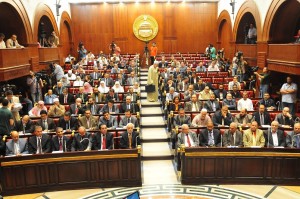
(DNE/ File Photo)
By Ibrahim al-Masri
Egypt is facing the prospect of “continued increases in its budget deficit”, former Prime Minister Ali Lotfy warned.
The statement came during a recent meeting of the Shura Council’s Economic and Financial Affairs Committee, in which Lotfy said that “the numbers regarding the deficit have become troubling, reaching EGP 197bn, as a result of premiums and interest rates owed by the government”.
He further criticised “the current division between the Ministry of Finance and Ministry of Planning and International Cooperation regarding Egypt’s GDP… [which] decreases confidence in Egypt’s budget”.
He added that so far, proposed government cuts amount to only EGP 42bn, and that further austerity measures were needed. He cited the country’s diplomatic presence abroad as an example, saying that the government “cannot afford to maintain 170 embassies” nor pay for the travel of its diplomats.
Lotfi also questioned recent increases in incentives for bonuses and allowances, noting that, “government salaries have reached EGP 28bn, with bonuses reaching upwards of EGP 74bn”.
He then pointed to the need to rethink the structure of Egypt’s various private funds, calling them “like Ali Baba’s cave, where the funds have exceeded 8,000”.
Restructuring subsidies represented another concern, with Lotfi pointing out that the subsidies in the budget currently total EGP 205bn. He suggested this figure be cut by EGP 68bn, saying that if steps are not taken soon, “our budget will eventually bring us to ruin.”
With regards to state revenues, he emphasised the need to combat tax evasion, which he pointed out costs the state EGP 30bn annually.
He also called on the government to better exploit the country’s gold mine reserves, while in the same breath rejecting calls to place taxes on bank allocations, saying that instead Egypt, “must better implement its real estate tax policy”.
He finally urged the government to employ lawyers specialised in international law to help retrieve Egypt’s “plundered” funds, saying that, “if we took to trying members of the old regime, we will inevitably be taking to court members of Egypt’s military”.
Also present at the session was former Finance Minister Hazim Al-Biblawi, who in contrast warned of the dangers involved in continuing to seek to try members of the previous regime, saying that, “such trials will not be recognised abroad, and will be seen as politicised”.
Al-Biblawi emphasised the need to implement minimum and maximum wage limits for government salaries, in addition to combating tax evasion and decreasing the country’s budget deficit.
He stated that what was needed now was to achieve political stability in addition to legal reconciliation amongst Egypt’s various factions, saying that, “we will soon feel the ramifications of such decisions if we do not do so now”.
Mohamed Al-Fiqy, Chairman of the Shura Council’s Economic and Financial Affairs Committee, stated that, “our country is suffering from a shortage in both competent politicians and sound policies. What we must do now is unite in our order to achieve our common national interests”.
Yamen Al-Hamaqi, economics professor and former Shura Council member, called on Egypt’s politicians to agree to reach a minimum political consensus in order to address the country’s investment crisis, saying that, “a department should be created within the Finance Ministry to put in place standards for the regulation of private funds”.
Translated from AlBorsa News



